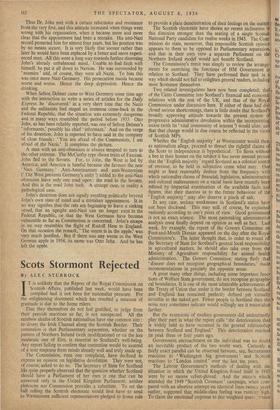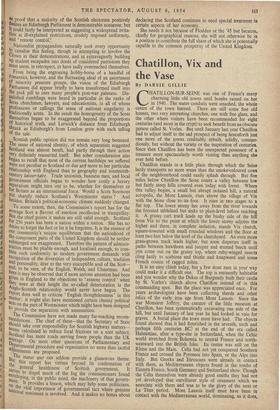Scots Stormont Rejected
ByALEC STURROCK IT is unlikely that the Report of the Royal Commission on Scottish Affairs, published last week, would have been compiled had it not been for nationalist pressure. For the enlightening document which has resulted a measure of gratitude is due to the home rulers.
That they themselves do not feel gratified, to judge from their peevish reactions so far, is not unexpected. All the rainbow shades of Scottish nationalism have one common aim: to divert the Irish Channel along the Scottish Border. Their contention is that Parliamentary separatism, whether on the pattern of Northern Ireland (with modifications) or on the less moderate one of Eire, is essential to Scotland's well-being. Any report failing to confirm that contention would be assured of a sour response from minds already well and truly made up. The Commission, runs one complaint, have declined to express an opinion on legislative devolution. They were not, of course, asked to do so. The Secretary of State for Scotland hhs quite properly observed that the question whether Scotland should have a Parliament of her own is one that can be answered only in the United Kingdom Parliament; neither plebiscite nor Commission provides a substitute. To set the ball rolling the Scottish electorate would first have to send to Westminster sufficient representatives pledged to home rule to provide a plain demonstration of their feelings on the matted i dei The Scottish electorate have shown no recent inclination in it this direction stronger than the seating of a single Scottish tio National Party candidate for twelve weeks in 1945. The Com' any mission do state, moreover, that responsible Scottish opinion appears to them to be opposed to Parliamentary separation, to and that in their own view a separate Parliament on the Cr Northern Ireland model would not benefit Scotland.
The Commission's remit was simply to review the arrange• mi ments for exercising the functions of HM Government in relation to Scotland. They have performed their task in a way which should not fail to enlighten general readers, including of most Scotsmen themselves. pa Two related investigations have now been completed; that ) the of the 'Catto Committee into Scotland's financial and economic sat relations with the rest of the UK, and that of the Royal Sc Commission under discussion here. If either of these had dis• closed serious shortcomings, there is little doubt that Scotland's broadly approving attitude towards the present system of progressive administrative devolution within the incorporating. union (with its vital community of interest ') would alter, and, that that change would in due course be reflected in the vicwg of Scottish MPs.
Whether the ' English majority' at Westminster would then; as nationalists allege, proceed to thwart the rightful claims or the Scots to independence is hypothetical. : To Scots without a bee in their bonnet on the subject it has never seemed proven that the English majority ' regard Scotland as a colonial source of revenue, to be held in subjection come what may. One might at least reasonably deduce from the frequency wii which nationalist claims of financial, legislative, administrative, and cultural maltreatment on a racial basis have recently been refuted by impartial examination of the available facts and figures, that their theories as to the future behaviour of the ' English majority' may also deserve a pinch of salt. nc be In any case, serious weaknesses in Scotland's status have not been disclosed. This may still, of course, be explained variously according to one's point of view. Good government Bt is not an exact science. The most painstaking administrative analysis must finally depend on opinion as well as fact. Last fo week, for example, the report of the Gowers Committee on de Foot-and-Mouth Disease appeared on the day after the Royal °I. Commission's. The latter thought that, in order to round elf th the Secretary of State for Scotland's general local responsibility su in agricultural matters, he should also take over from the tr; Ministry of. Agriculture responsibility for animal health bi administration. The Gowers Committee, stating flatly that re ' disease does not recognise geographical boundaries,' Mad0 ar recommendations in precisely the opposite sense. ai A great many other things, including some important funk:• he tions of Welfare State government, do not recognise geographi• cal boundaries. It is one of the most admirable achievements of to the Treaty of Union that under it the border between Scotland A and England has remained perfectly defined yet virtually ! re invisible to the naked eye. Feiver people in Scotland than the 111 noise may sometimes indicate would willingly see it materialise 11( farther. tc But the extensions of modern government did undoubtedly play their part in what the report calls the deterioration that is widely held to have occurred in the general relationship between Scotland and England.' This deterioration reached its peak three or four years ago.
Government encroachment on the individual was no doubt an inevitable product of the two world wars. Certainly a fairly exact parallel can be observed between, say, Sacramento reactions to ` Washington big government' and Scottish reactions to ' London control' over the last ten years. ail proof that a majority of the Scottish electorate positively r desires an Edinburgh Parliament is demonstrable nonsense; but n it could fairly be interpreted as suggesting a widespread irrita- 11 ton at ill-explained restrictions, crudely imposed uniformity, 1' and remote control.'
Nationalist propagandists naturally took every opportunity 'I! to canalise this feeling, though in attempting to involve the is Crown in their demonstrations, and in extravagantly building up student escapades into deeds of considered patriotism they must seem, in retrospect, to have sadly overreached themselves. From being the engrossing hobby-horse of a handful of romantics, however, and the fluctuating ideal of an assortment of minority pressure groups, the vision of the Edinburgh ,t Parliament did appear briefly to have transformed itself into ' the pink pill to cure many people's post-war paleness. Dis- K, I satisfied rumblings were heard in particular in the ranks of Scots churchmen, lawyers, and educationists, in all of whose . professions or callings the sense of national singularity is traditionally acute. In the result the homogeneity of the Scots themselves began to be exaggerated beyond the proportions 1 Of historical truth, and Lerwick's distance from Edinburgh shrank as Edinburgh's from London grew with each telling of the tale.
11, Scottish public opinion did not remain very long bemused. )f The sense of national identity, of which separatists suggested it Scotland was almost bereft, had partly through their action very definitely reasserted itself. But sober consideration also began to recall that most of the current hardships we suffered Were not peculiar to Scotland or due an? more to her particular li relationship with England than to geography and nineteenth- , , . century laisser-faire. Trade unionists, business men, and local a government officials began to wonder how costly a luxury 3 separatism might turn out to be, whether for themselves or for Britain as an international force. Would a Scots Stormont • besides, sharply reduce Scotland's Westminster status ? And besides, Britain's political-economic climate suddenly changed. To some extent, then, the Commission's report has for the ,t average Scot a flavour of emotion recollected in tranquillity. 0 But the chief points it makes are still valid enough. Scotland .t for 250 years has been a nation within a nation. She has no n desire to forget the fact or let it be forgotten. It is the essence of our community's unique equilibrium that the nationhood of If the component parts of the United Kingdom should be neither y submerged nor exaggerated. Therefore the pattern of adminis- 0 tration must be pliable enough, and localised enough, to com- It bine such conformity as modern government demands with it recognition of the diversities of independent culture, tradition O and personality, dear to the very susceptible soul of the. Scot— and, to be sure, of the English, Welsh, and Ulsterman. And here it may be observed that if more serious attention had been given in England to the objections to `remote control' when tb„ eY were at their height the so-called deterioration in the tinglo-Scottish relationship would never have begun. The v report does well to criticise English thoughtlessness' in this Matter: it might also have mentioned certain clumsy political • acts on the part of Westminster which might have been designed to provide the separatists with ammunition. The Commission have not made many far-reaching recom- t ulendations. The chief of these—that the Secretary of State p should take over responsibility for Scottish highway matters— ,l seems calculated to reduce local frictions on a sore subject. Scotland has more roads serving fewer people than the UK t Departmental On most other questions of Parliamentary and uePartmental procedure and organisation no more than tactful ) adjustments are proposed. .b_The status qup can seldom provide a glamorous theme. ',at this report has virtues beyond its confirmation of • -• See general healthiness of Scottish government. It 5.'_erves to dispel much of the fog the commissioners found in the public mind, the machinery of that govern- - went. It provides a lesson, which may help some politicians, s on the vital importance of governmental tact where genuine national sentiment is involved. And it makes no bones about declaring that Scotland continues to need special treatment in certain aspects of her economy. She needs it not because of Flodden or -the '45 but because, chiefly for geographical reasons, she will not otherwise be in a position to contribute the full share of which she is potentially capable to the common prosperity of the United Kingdom.



































 Previous page
Previous page